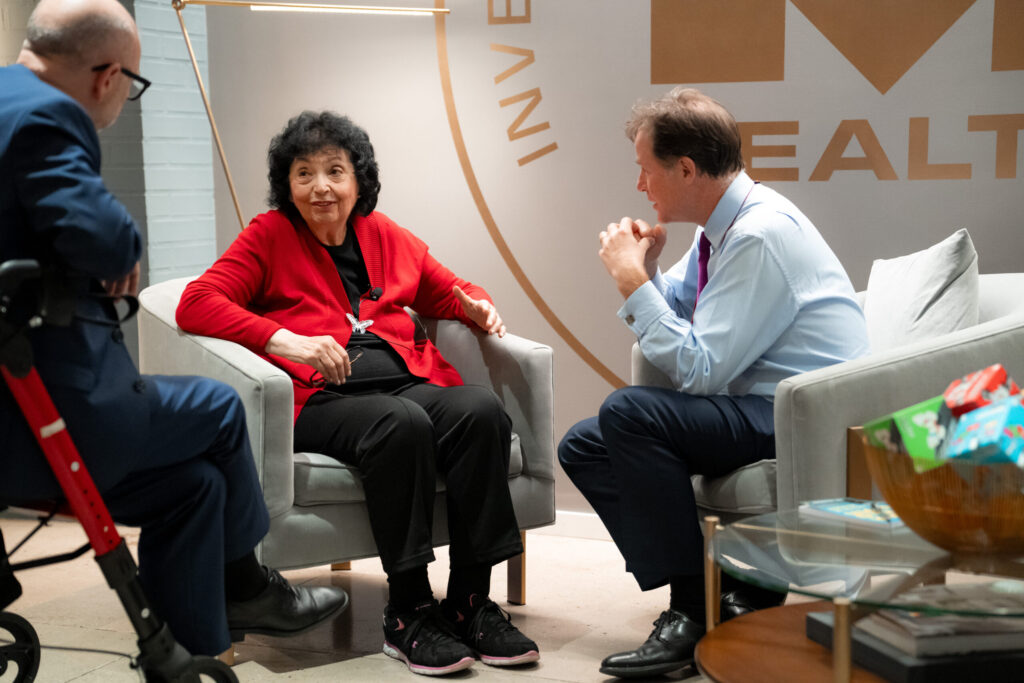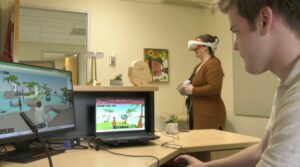Bringing Holocaust education into the Metaverse
3 min read
With the myriad challenges facing Holocaust education these days, the most pressing, and seemingly unavoidable, is time. All too quickly, the world is being forced to accept a difficult truth: that soon there will be no survivors left to share their stories.
In an effort to combat this grim reality, and to propel Holocaust education into the future, Meta and StoryFile, in partnership with the United Nations Educational, Scientific and Cultural Organization (UNESCO,) the World Jewish Congress and the Conference on Jewish Material Claims Against Germany, celebrated the international launch of “Tell Me, Inge…,” a new virtual reality and extended reality experience through one survivor’s life during World War II, on Wednesday evening at Ivy Terrace in Midtown Manhattan.
“I think Meta deserves a lot of credit for taking this seriously,” Ambassador Deborah Lipstadt, the U.S. special envoy to monitor and combat antisemitism, who was in attendance at Wednesday’s event, told Jewish Insider. “It would be wonderful if all online platforms lived up to the standards they set for themselves.”
“Tell Me, Inge…” shares the story of chemist and noted Holocaust writer Inge Auerbacher, who survived the Theresienstadt Ghetto as a child. Auerbacher, who was born in Germany, but has lived in the U.S. since 1946, was in attendance at the launch event and participated in a conversation with Meta’s president of global affairs, Nick Clegg, which was moderated by StoryFile CEO and co-founder Stephen Smith.
“I do not want to leave this earth just as somebody in a coffin,” Auerbacher said of her decision to continue sharing her story. “I want my life to have meant something, especially for all the murdered Jewish children.”
Recorded over two days, “Tell Me, Inge…” presents itself as an intimate conversation between the listener and Auerbacher, but on a new stage: the Metaverse. Inside Meta’s virtual world, the user is presented with a seated Auerbacher, alone apart from her red memory box and the wooden end table it sits atop.
Users have the option of interacting with Auerbacher by asking her questions directly or by clicking on a series of prompts digitally projected across the screen, after which Auerbacher can be heard narrating her story as hand-drawn animations give a visual depiction of the scenes as she describes them.
“The use of new kinds of media will speak to a segment of the population in a way that they’re used to being spoken to,” Lipstadt told JI. “Some people will like it, some people will not like it, but you got to start where the client is at, and there are a lot of young people who we hope will respond to this, so I’m glad to see it happening.”
Despite the advancement of the technology as it stands, Clegg sees “Tell Me, Inge…” as a “pioneering” project. It may take a while, he said during the conversation, for Meta’s virtual reality technology to be as accessible and lightweight as it could be, but “Tell Me, Inge…” will always be viewed as a leader in immersive education and personal virtual experiences.
As an accompaniment to the project, the Claims Conference created a written educational guide for use by young adults to help grow Holocaust education in the classroom. Also in attendance on Wednesday night were World Jewish Congress President Ronald Lauder, UNESCO Director-General Audrey Azoulay, White House Jewish liaison Shelley Greenspan and Claims Conference President Gideon Taylor.
“Where does hatred begin? At a young age. You learn it from your friends, you learn it from your parents, friends, etc… and that’s where the Holocaust really began,” Auerbacher said.
Source link
#Bringing #Holocaust #education #Metaverse






